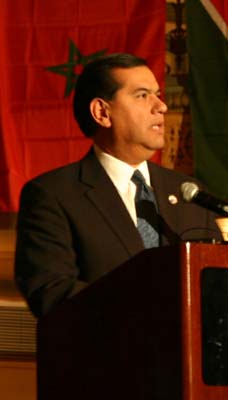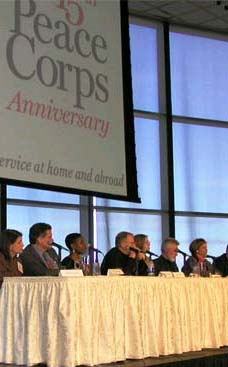
Weddings are a major event in my village, Borguindé, and people look forward to them for weeks. They’re a chance to party, to eat a lot and to make visits to, or receive visits from, relatives in other villages. People deck themselves out in their best clothes, buy pagnes and generally go all out to have a good time. Weddings typically last at least three days — and occasionally they go on for five days or a week.
Natalie Boittin, a Peace Corps Volunteer serving in Borguindé, Burkina Faso reports on the — often surprising — wedding traditions in her village
Getting Married in Burkina Faso
By Nathalie Boittin | Tuesday, May 02, 2006
Daughters who are not informed of their wedding until the afternoon of wedding day. Grooms that are considered superfluous. And a big surprise as to who gets really showered. Natalie Boittin, a Peace Corps Volunteer serving in Borguindé, Burkina Faso, who has now been in country for nine months, reports on the — often surprising — wedding traditions in her village.
e-Briefing Services for Businesses
ast Christmas, shortly after a brief trip to Ouagadougou, I was sitting in one of my village mother’s courtyards, when one of the girls casually mentioned that Samma was getting married — Samma being a 16-year-old friend of mine.
I have been told that no African woman would ever smile at her own wedding, but I was still caught off guard by the sudden display of violence.
I was so astonished I dropped my knife (I was cutting the leaves off of millet stalks at the time), but I really should have been surprised that she wasn't already married, given the age at which kids get married around here.
The women of most Burkinabè ethnic groups marry very young, often at 13. I live in a Peulh community, Peulhs being a semi-nomadic community of cattle-raisers spread out over West Africa, and not only do the women marry young, but they also often marry very close relatives. In fact, two brothers often decide that they want their children to get married.
Peulh tradition
That's very much a Peulh tradition. Most other ethnicities in Burkina have decided that marrying first cousins isn't a very good idea.
From a Western standpoint, though, the other ethnic groups weddings have some drawbacks as well. Take the Mossis, who occasionally marry a 13-year-old daughter to a 50-year-old man because he's an old family friend. Not only that, but they often don't inform their daughter of the wedding until, not the day of, but the afternoon of, the wedding.
Crying bride
As tradition has it, the girl then starts to shriek and cry, as do all her friends. Then someone brings over all the pagnes (brightly dyed pieces of cloth
They often don't inform their daughter of the wedding until, not the day but the afternoon of the wedding.
used as wedding gifts) which the girl has gotten for her dowry.
All the friends stop crying long enough to see out how many pagnes the girl has received, while she keeps crying until her father comes over to beat her, to make her stop crying.
After this, the blushing bride is dragged into a hut to get prettied up — and then gets piled onto a motorcycle and taken to her future husband's village.
Women getting stolen
In a region down south, a friend of mine once asked the department prefect what he thought the area's "biggest problem" was. His answer? Women getting stolen.
Women getting stolen? It turns out that in that area a man will kidnap a woman and take her off, and return her to her family a few days later.
However, by the time she has returned she is considered to be dishonored, and so has to marry her kidnapper. You can't win if you're a Burkinabè woman.
Borguindé’s weddings
Weddings are a major event in my village, Borguindé, and people look forward to them for weeks. They’re a chance to party, to eat a lot and to make visits to, or receive visits from, relatives in other villages.
Note that the groom has no role to play at all. Their presence is entirely superfluous in either planning or carrying out a wedding.
People deck themselves out in their best clothes, buy pagnes and generally go all out to have a good time. Weddings typically last at least three days — and occasionally they go on for five days or a week.
Although I have only lived in my village for a few months now, I have attended several weddings, starting with Samma’s. Over the course of these events, I have managed to piece together the typical proceedings.
The festivities begin
On the first day, all the women dress up in their nicest clothes, and then pound the millet together in time to a group of musicians playing drums and flutes. As they pound, they circle slowly around the mortars and toss the heavy wooden staffs that serve as pestles into the air, clapping their hands before catching them again.
The flour is then made into tô (a kind of thick millet dough served with various sauces, that people here eat morning, noon, and night), for everyone to eat.
First appearance
On day two, the bride makes her appearance. I was rather disturbed the first time I witnessed this ceremony.
Someone tore the pagne from the bride's head, so she was standing half naked in front of us, covering her face and still weeping.
I was led by a group of girls to the bride’s hut, where all the women crowded around a mat in front of the door. After a while, the bride stepped out, a pagne wrapped around her waist and another draped over her head, and I realized that she was weeping under her pagne.
I was shocked when someone tore the pagne from her head, so she was standing half naked in front of us, covering her face and still weeping. Suddenly a woman in the crowd lunged forward and tackled the bride to the ground.
No smiling African bride
Then, three more women jumped on top of her and tried to force a pair of new shoes onto her feet. The crowd cheered and laughed — and the bride kicked and struggled and started a kind of wailing chant.
I knew that it was all part of the ceremony, and I have been told that no African woman would ever smile at her own wedding, but I was still caught off guard by the sudden display of violence.
Day three comes
After the tackle, a woman picked up the bride and started to slowly carry her to the neighborhood where she would be living.
On the first day, all the women dress up in their nicest clothes, and then pound the millet together in time to a group of musicians playing drums and flutes
One by one, all the women took turns carrying — I got my turn too, although the women laughed at me.
It’s generally believed that, as a toubakou (white person in Fulfuldé), I am utterly unfit for any form of physical work, although it is acknowledged that I have very impressive reading skills.
Day three is more millet pounding, and more music. The dancing lasts far into the night, much later than I can usually manage to stay awake. And occasionally, the wedding continues into the following days, especially if many people have come from other villages.
Missing groom
Note that the groom has no role to play at all. In fact, in Samma’s case, the groom was not actually present at the wedding. He was in Bobo, and wouldn’t be returning to his bride for several months.
Men back home should take note that their presence, as many may have suspected, is entirely superfluous in either planning or carrying out a wedding.
The most interesting wedding
The most interesting wedding I have been to took place not in my own village,
A man will kidnap a woman. When she has returned she is considered to be dishonored, and so has to marry her kidnapper. You can't win if you're a Burkinabè woman.
but a dozen kilometers away. I was less than enthusiastic about the prospect of biking to another village for a wedding.
However, someone came to Borguindé and mentioned the upcoming wedding in her village, Diguetao, and was I going to come?
I stuttered what I thought was a polite refusal, but one of my village mothers overheard and loudly announced that "OF COURSE she's coming! Right? You're coming, right?" So I smiled weakly and mumbled something, hoping that they weren’t really expecting me to make the trip.
Winding through the Sahel
But when the big day arrived, and everybody in my neighborhood was preparing to go, they all asked me when I was planning to leave. So I gave in and I agreed to come, but just for a little while and definitely not to spend the night away from home.
I got a pagne ready to give as a wedding gift, and pedaled off, accompanied by my sister, or cousin, or something (I am not always clear on how I am related to people in village). And it’s a good thing she was there to show me the way, because we biked through 12 kilometers of sand path winding through the Sahel. I could never have found the way without a guide.
Pedaling past camels
Once we were on the way, I felt more cheerful about the idea of going to
It’s generally believed that, as a white person, I am utterly unfit for any form of physical work, although it is acknowledged that I have very impressive reading skills.
a wedding and seeing a new village. Also, there’s something very peaceful about pedaling through the sand, passing a few huts here, some camels there.
Unfortunately, I had forgotten until the moment all arrived in the village what a big deal it is in a village when a white person shows up. I am used to my own village now, and they are used to me.
But when I showed up in a new village it was a HUGE deal. The elder thanked me over and over again for condescending to come such a long way to see them, while I squatted by his mat and shook his hand and smiled and thanked him for his hospitality.
Where's toubakou?
Then I was pulled into a house to drink tea and eat, first some bouillie (a kind of porridge made out of millet), then gappal (a kind of thick millet dough eaten with sour milk).
Notice that there was no talk of the wedding here, but there was a lot of talk about toubakou. While sitting in the hut, I could hear people coming to the door, loudly calling out “Where’s toubakou? We’ve come to look at toubakou!”
Delayed start
And although you would think I would be used to it by now, I still get very tense when people announce that they have come to stare at me like I am some kind of zoo animal. I try laughing it off, staring very intently back at people, or answering the cry of “toubakou!” with “balejo!” (black person in Fulfuldé).
I was less than enthusiastic about the prospect of biking to another village for a wedding.
In the United States that would be considered offensive, but it’s normal for people here to refer to each other by physical qualities — it’s ok to call out to someone in a wheelchair, “Hey, cripple!” which certainly wouldn’t be acceptable back home. So nobody blinks if I call them balejo.
After I had eaten and been stared at for a while, I was asked to bike to my guide’s aunt’s house to meet her. She gave me a chicken. Then I went to a village elder’s house — and he gave me peanuts. And so the day wore on, and still the wedding showed no signs of starting.
Sleeping through the festivities
Finally, it became clear that it wouldn’t start until nightfall, so I had to spend the night. I probably could have insisted on going home, but everyone else wanted to stay for the wedding.
I didn’t want to force someone to accompany me back — and I certainly couldn’t have found the trail home alone. So I spent an absolutely miserable night sleeping on the floor of a hut on a mat, while the bugs crawled all over me.
I wound up not actually witnessing the wedding at all because I slept through it. I suppose that the most interesting wedding I have been to was the wedding I didn’t actually witness.
Villages blessings
In retrospect, I must say that I was generously rewarded for my efforts, although not because I asked for anything.
The elder thanked me over and over again for condescending to come such a long way to see them.
I biked to the wedding with a pagne for the bride. I left with three live chickens dangling from the handlebars of my bike, and a sack of millet, another of peanuts, and yet another of beans in my backpack, along with a handful of kola nuts and the blessings of the entire village.
Not only that, but when my village mother returned to Borguindé a few days later, she brought me a pagne as yet another gift.
Being accustomed to American weddings, where you arrive with your blender or your matched linens and leave with a full stomach, I feel guilty about the weddings here. I brought a strip of cloth to a wedding, only to receive a strip of cloth in return — as well as countless other gifts.
Generous hosts
By now, I am getting used to the mentality of giving presents — that is part of the culture I am living in. I am also coming to terms with the fact that people in Burkina Faso make it a point of pride to give the resident toubakou gifts.
While I try to reciprocate, there’s just no way I can keep up with all part of the cross-cultural experience. I suppose, at this point I think at least I can say I understand weddings pretty well.
From now on, whenever I will attend another wedding back in the States, I will be bringing a two-meter strip of dyed cloth as a gift. And I will expect to leave with a waffle iron and some pillowcases as well as my piece of wedding cake!



















